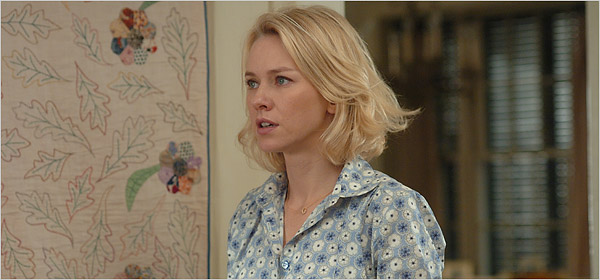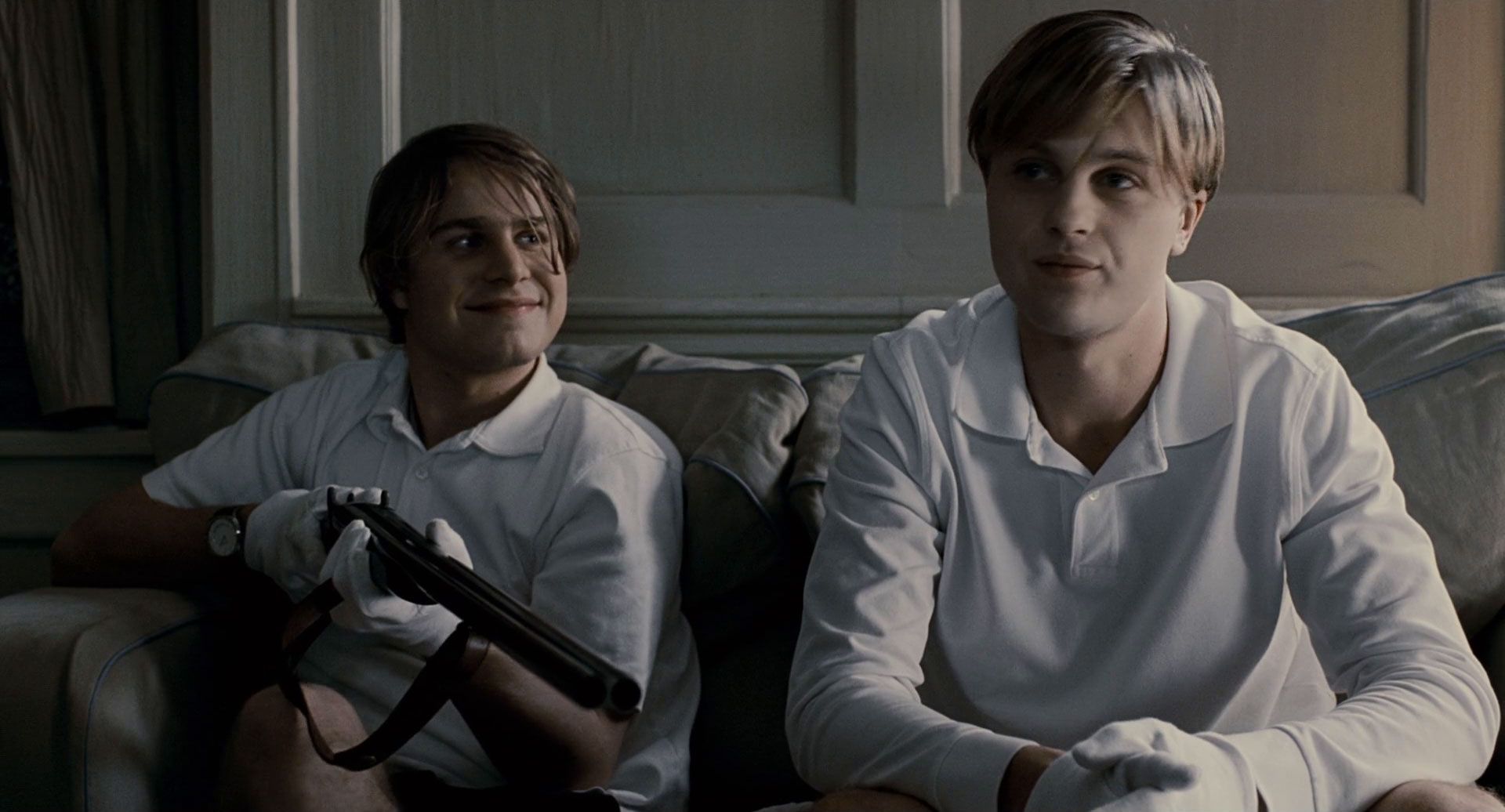Funny Games has been on my radar since it first came out. But, the idea seemed so exploitative, and utterly abusive to its characters, that I didn’t want to go anywhere near it. What I didn’t understand was that that was the exact point. When Michael Haneke wrote and directed this film, it was 100% because he was wanting to say something important about our current state of entertainment. He wanted to say something that wouldn’t be immediately grasped by most viewing audiences. I believe that Funny Games is actually psychotropic sort of thriller that is intended to do something to you, to you and to the way you think about your “entertainment choices.” OK, should we dive in? Shall we start explaining Why Funny Games is Only Meta Hilarious?
Funny Games tells the story of a family who get taken hostage in their own home by two psychopaths who seem to want nothing more than to play games with their embattled hostages. If you haven’t seen this inspired little film starring Tim Roth (Pulp Fiction, and my personal favorite, Rosencrantz and Guildenstern are Dead), Naomi Watts (Birdman, and Mulholland Drive), it is a fairly rough concept to wrap your head around. But trust me when I say, the movie isn’t what it appears to be, which seems to be an exploitative torture flick. It isn’t that at all. Instead, it’s a meta-conversational film about our culture’s love affair with exploitative torture films. So, regardless of whether you think that’s interesting or not, please don’t go further down this page without watching the film. WHICH, you can do here, or here.
Funny Games Movie Walkthrough
The Farbers – George, Ann, and Georgie, are heading up to their Lake House for some much needed R&R time. And just like that, we have established the Farbers as the rich and the affluent. If you can say the phrase, “We are heading to the Lake House…” you are rich beyond all reckoning. In my real job, I work with underprivileged children around the world where affluence is defined by whether you have running water in your house. This, though, is something entirely different. Lake House rich is beyond timeshare rich. Lake House rich is defined in the Webster’s dictionary as so utterly rich you number your homes because you have so many. And so Haneke has set up the Farbers as individuals from a class of wealth that 99.9% of the planet can only dream wistfully about, and will never experience. The Farbers, my friends, are a punching bag. A foil. They are a meta-stereotype of an idea. That aren’t meant to be actually real. They are stand-ins for your own concept of “The Rich.” And throughout this film, this stereotype, of yours, will be played upon with great adeptness by Haneke and his crew.
As they head up to the house, they notice that their next door neighbors are talking with two young people, Peter and Paul, our perpetrators. And after a bit, Fred, Peter and Paul head over to help George put the boat in the water. But it’s immediately clear that something is rotten in Denmark. And we learn why in a few minutes, when Peter comes to ask Ann if he can borrow some eggs. A few minutes later, after some give and take, Paul asks to borrow a golf club. And outside, Lucky, the family’s dog, goes nuts for a bit and then stops. And when Ann gets frustrated with Paul’s not leaving, she slaps him, and in response, he breaks George’s leg with the golf club. The events of Funny Games has now officially begun, the Farbers are now hostage in their “Lake House.”

It would seem that Paul’s main desire is to toy with the family. To manipulate them, and see what kind of responses he can get out of them. (Or maybe the main desire is for the movie to do that with us? We’ll see.) Anyway, one of the sadistic games he plays with the couple is asking them if they want to bet whether or not they will be alive by 9 AM tomorrow morning. As the events continue forward, we get very contradictory ideas as to Paul and Peter’s origins. It reminds me of Nolan’s handling of the Joker in The Dark Knight wherein The Joker keeps telling contradictory stories about his childhood.
One of the particular games that Peter and Paul played on the family actually was responsible for my avoiding the movie as long as I did. Here’s the setup. Georgie has a bag put over his head, and meanwhile, Ann is asked to strip naked. But Ann refuses, until Georgie nearly suffocates, and George asks his wife to do it. At which point she does, and they release Georgie from near suffocation. Here’s the trick though, throughout Ann’s undressing, the camera cuts to Ann’s face as she disrobes. It flips to Paul, and Peter, and George, back to Ann’s disgusted face, then she’s allowed to dress. The trick here being with the viewing audience. I 100% expected the movie to gawk at Naomi Watts (notice that I didn’t say Ann here). And in Michael Haneke’s decision to not do that, he is saying something more about us than about anyone else.
This particular setup sort of reminds me of that horrible situation in the movie Compliance wherein a crank caller tells a fast food manager that one of her employees is under surveillance for wrong doing. The crank caller is just attempting to manipulate very willing individuals into sexually manhandling another human being. Funny Games seems as though it too might be doing something similar, but calling us out on the mischievousness in a subtle cinematic choice of cropping to Naomi Watts’ face throughout the “game.” Is that making sense? It got meta there for a second. (Don’t worry, it’ll get worse in due time.)
Soon after the “Suffocate Georgie” game, Georgie makes a run for it to the next door neighbors. Only problem is that Paul and Peter had already visited there, and he discovers nothing but bloody corpses. Paul soon after finds him there. Georgie had discovered an old hunting rifle, and Paul urged Georgie to shoot him with it…but nothing happens when he pulls the trigger. Soon after, Paul and Georgie return back to Peter who has tied Ann up.
It’s then that Peter and Paul decide to play another game. The men will “eenie meenie miney mo” until they decide on an individual, and then that person will be shot and killed. But while Paul is in the kitchen raiding the fridge, Georgie makes a run for it. Well, that didn’t go over too well with Peter, and so he shot him and killed him. Now, notice, this too was gratuitousness that was off-screen. I gotta stop and talk about this for a moment.

The Violence of Nonchalance
The above screen capture was taken from the movie at the exact moment that Georgie is shot. We know that Georgie has been slated for death by the eenie meenie miney mo counting. (Which Paul rigged to end up being Georgie.) And then Paul leaves Peter to it, as he heads into the kitchen to grab some grub. “Anybody want anything?” Did he honestly expect Ann or George to respond? Or better yet, Georgie? “Sure! Maybe a tuna fish sandwich?” No, it’s Paul’s horrific nonchalance to death, no, to brutal first degree murder, that just completely makes this scene. After the gun goes off, there is thrashing and wailing in the other room…but what does Paul do? He continues to grab food and fuss about the kitchen, while we, the viewing audience are left wondering who just died. It is the movie’s utter indifference to the sanctity of human life that is so mind-alteringly upsetting here. It’s actually a play from the Alfred Hitchcokian playbook. Hint at the violence, and allow the mind to fill in the worst possible scenario for you. And our minds do it wonderfully. But then, on top of that, place this loafer-wearing psychopath in the kitchen as our point-counterpoint syncopation.
Cut back to Ann and George, where we see that Georgie has been killed. Soon after Peter and Paul leave for a moment, and George and Ann decide they are going to survive, despite their raging grief, survive at all costs. Ann says her goodbyes to George (whom she assumes is about to die), and flees in the hopes of calling for help. But very soon after, Peter and Paul find Ann and bring her back to the house. They stab George, and tell Ann to share a heartfelt prayer…think about that for a second. Paul tells her to redo her prayer, because it wasn’t earnest enough. Then she’s told to make a decision – should George be killed quickly with a big shotgun, or slowly, with a little knife? But while Paul soliloquizing, Ann grabs the shotgun and kills Peter.
Wait? What? That is AWESOME!!! This movie has a ray of sunshine in it? Because, all signs pointed to a gruesome and horrifying ending. An ending wherein the psychopaths running this game would win brutally, and George and Ann wouldn’t stand a chance. But Ann kills Peter? How? This breaks meta it’s so meta. Actually, it’s so outside the framework of what was coming…so utterly wrong, that I stopped the movie and said out loud, “WHAT?” Trust me, I was totally stoked that Ann got her some revenge. But I was seriously confused. Heck, it’s a movie where Paul, moments before, had just turned, and looked down the barrel of the movie camera, and said to us, “Do you think it’s enough? You want a real ending, with plausible plot development, don’t you?”
So what does Funny Games do now that one of their serial killer protagonists is dead? Paul, finds the TV remote…get this…he rewinds the movie. Hahahaha! Ah, yes, this is the movie I expected. You shouldn’t have done that Ann. Now, say goodbye to George, Paul says to Ann…and then he shoots him in the head.
Yes, this really is fatalism at its deterministic, entertaining finest.
Paul and Peter take Ann out to the sailboat out on the lake – you know, the one they helped unload an eternity prior? And the three of them head out onto the lake. But Ann has a knife, and she is frantically trying to cut the ropes that are binding her. But too soon, the evil duo, grab her and place her between the two of them. And feeling like Ann has become more tiring than fun anymore, Paul kisses her on the cheek, and unceremoniously pitches her backwards into the water. But all the while the two are discussing a movie wherein the father of a family finds himself bounced into a false parallel universe. A fiction. All while the rest of his family is stuck in the true reality. But are they both on screen? Are they both in the movie? Yes, well, then that’s bull. And then they head on to the next residence on the lake, to repeat the movie all over again with the next innocent victims.

Funny Games Explained
No. There is too much, I’ll sum up. Funny Games is actually a remake of a German movie that Michael Haneke made in 1997 with the same name. Trouble is? No one saw his original film. But in that movie, which I watched because there just wasn’t enough brutal violence in his remake, the movie opens with a complicit wink. To whom? The woman looking for her dead dog? No. To you. To me. To the audience.
This, similarly, is how the 2007 remake of Funny Games goes. What is that wink about? What is the dialog to the audience about a fulfilling our desired plot development and expectations. This movie has NOTHING to do with Ann, Georgie, and George. They aren’t real. This movie isn’t even about Paul and Peter, and the rising tide of psychopaths in society. It’s not about hopelessness, or nihilistic dread. It’s about you – your furious desire for violence in your “fun.” Your desire for bloody entertainment. In a word its about schadenfreude. Disagree? Haneke has literally said as much. Funny Games – the 2007 version – “was intended to be for a public of violence consumers in the English-speaking world. A film can do nothing, but in the best case it can provoke so that some viewer makes his own thoughts about his own part in this international game of consuming violence, because it’s a big business.” So, unfortunately, Funny Games is about you – and our habit of consuming violence for fun.
Postmodern deconstructionism and meta-contextuality is a playground where my brain spins and twirls as it sings that the hills are alive with the sound of music. And this movie has me literally Julie Andrewsing my way across a universe of Austrian Alps that progress infinitely onwards. This movie is basically deconstructing itself in front of our very eyes. It’s taking a wrench to its own inner-workings and tearing itself down as we watch. It doesn’t even ask us to help.
Think about it. There are a couple cardinal rules that movies always follow. First, NEVER kill the dog. Just don’t do it. (John Wick being the noted exception, and 300 people die for it.) The rule is golden. The dog cannot die. You can ACT like you kill the dog, but the dog has to return safe and sound before the movie ends. But here? That is where Haneke STARTS for heaven-sakes. The child? If the dog is off limits, the family’s child is doubly so. Especially a cute cherubic angel like Georgie. I even caught myself wondering how they filmed the movie in order to shield the boy from the horrific violence all around him.
But why did Haneke break these two key, cardinal rules? Well, to shock us awake to the meta-conversation he is having here about the violence inherent in our entertainment choices. Better yet, why did he have Paul talk to us just before almost each and every horrific event? Well, he did that to make us complicit. To take the edge off of the violence, take us outside of the violence, and then to make us also responsible. He was goading us into believing that he wouldn’t actually kill the dog. Goading us into believing that that he can’t actually kill the kid. That he wouldn’t actually murder George. Or the wife and mother. And he does this to rope you into the events themselves. To make you a part of this duo. Haha, now that I think about it, this isn’t a devilish duo doing these heinous things, it’s actually a terrifying trio. And you are the silent member of their crew.

Final Word on Funny Games
I thought, for years, that Funny Games would be torture porn and I just wasn’t interested in that in the least. But Haneke once said this about his film Funny Games, “Anyone who leaves the cinema doesn’t need the film, and anybody who stays does.” And in that, he encapsulates the essence of this horribly good morality tale. So if you made it through this film, stop. Just stop. And know that your gauge of what is too violent and wrong, is broken.
Don’t worry there though, I’ll be there for you. My idea of what is too violent has been broken for years. I say we start conducting Violence Anonymous meetings.
“Hi, I’m Taylor Holmes… and I am a Violence-aholic.”
Edited by: CY


